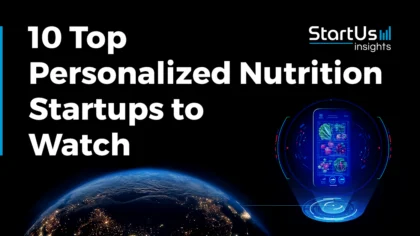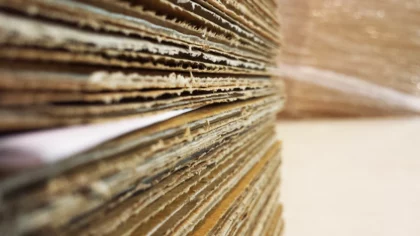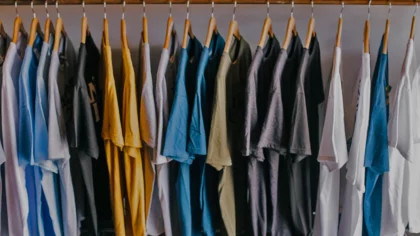Staying ahead of the technology curve means strengthening your competitive advantage. That is why we give you data-driven innovation insights into the circular economy. This time, you get to discover 5 hand-picked surplus food management solutions.
Global Startup Heat Map highlights 5 Top Surplus Food Management Solutions out of 120
The insights of this data-driven analysis are derived from the Big Data & Artificial Intelligence-powered StartUs Insights Discovery Platform, covering 1.379.000+ startups & scaleups globally. The platform gives you an exhaustive overview of emerging technologies & relevant startups within a specific field in just a few clicks.
The Global Startup Heat Map below reveals the distribution of the 120 exemplary startups & scaleups we analyzed for this research. Further, it highlights 5 surplus food management solutions that we hand-picked based on criteria such as founding year, location, funding raised, and more. You get to explore the solutions of these 5 startups & scaleups in this report. For insights on the other 115 surplus food management solutions, get in touch.
OLIO builds a Food Sharing Platform
Food waste is responsible for about 7-8% of global greenhouse gas (GHG) emissions. Additionally, nearly 30% of the world’s agricultural land is currently occupied to produce food that is ultimately never consumed. One of the possible solutions to the food waste problem is creating platforms for food sharing. Such platforms enable local businesses and citizens to share excess food with their neighbors, local NGOs, or underprivileged people. That is why startups are developing food sharing platforms and apps that empower local communities to save nutritious products from being wasted while also helping those in need.
UK-based startup OLIO builds a food sharing platform that brings neighbors together to rethink the wasteful culture of the linear economy. The platform helps hundreds of businesses, such as retailers, caterers, hotels, and restaurants, to prevent food waste. The surplus food rescued by volunteers is safely re-distributed to the local community via OLIO’s platform. To date, OLIO has 1.8 million users all over the world sharing over 3.4 million portions of food. According to the company, that is the equivalent of preventing 2.898 CO2 emissions from entering the atmosphere.
Replate facilitates an On-Demand Pickup of Surplus Food
If food waste was a country, it would be the third-largest greenhouse gas emitter globally, behind China and the United States. This is because the resources needed to produce the food that is wasted have a carbon footprint of about 3.3 billion tons of CO2. In order to help in solving the food waste problem, startups offer platforms for on-demand surplus food pickup. By saving food from the landfills, such platforms help to prevent methane emissions, while also saving people that experience food insecurity.
US-based Replate offers a platform and services for on-demand pickups of surplus food. The platform enables businesses to easily donate surplus food to people in need. Replate’s food rescuers pick up the food at a convenient time for businesses and then bring it to those experiencing food insecurity in their local community. Businesses that donate surplus food can track their social and environmental impact through a personalized dashboard.
FoodChain creates a Marketplace for Food that is close to expiration
One-third of all food produced in the world – approximately 1.3 billion tonnes – is lost or wasted every year. In order to overcome the food waste problem, the world needs a systemic approach and multiple solutions that complement each other. One of such solutions that are beneficial both for business and consumers is a marketplace where products nearing their expiration date are sold at discounted prices.
Bulgarian startup FoodChain creates a marketplace where companies can offer unsold food for a reduced price. This marketplace enables businesses to gain new customers, increase revenue by selling products that would otherwise be wasted as well as reduce their environmental impact. Using the web or mobile app people can find, book and pay for their desired products. Thus they save food from being wasted while also saving money.
Goodr develops a SaaS Logistics Platform for Surplus Food Management
The problems of hunger and food loss are interconnected. In the United States alone over 72 billion pounds of edible food is wasted every year, while 42 million people are suffering from food insecurity. Thus it requires not only good intention but also well-organized logistics, to bridge the gap between the businesses that have surplus food and people suffering from hunger. In order to help in solving the above-mentioned problem, startups develop platforms to optimize surplus food logistics.
Goodr, a US-based startup, develops a Software-as-a-Service (SaaS) platform that tracks an organization’s surplus food from pickup to donation, delivering real-time social and environmental impact reporting analytics. This platform enables businesses and organizations to track, account for, and manage their surplus food and organic waste. The Goodr model provides its clients multiple benefits, such as tax deduction for charitable donations, reducing greenhouse emissions, and helping underprivileged members of the local community.
FeedBack App works on an App for Discounted Food from Local Restaurants
Approximately 4% to 10% of food purchased by restaurants is wasted before ever reaching the consumer. Cooked meals also often are wasted due to overpreparation and other reasons. Thus, surplus food in restaurants and cafes is one more issue that requires a circular economy approach. That is why startups offer a way to solve the above-mentioned problem by creating platforms where people can buy remaining meals from local restaurants for a reduced price.
Canadian startup FeedBack App works on a mobile platform that enables customers to rescue excess food from local vendors while saving money. In the app, users get access to hundreds of time-specific promotions at Toronto’s restaurants. Customers order food directly through the app, then arrive at a selected restaurant during the given pick-up hours and present an in-app mobile receipt to collect the ordered food.
Discover More Circular Economy Startups
Startups such as the examples highlighted in this report focus on reducing packaging waste, conserving oceans and forests as well as developing alternatives to plastic. While all of these technologies play a major role in advancing sustainability, they only represent the tip of the iceberg. To explore more circular economy technologies, simply get in touch to let us look into your areas of interest. For a more general overview, you can download one of our free Industry Innovation Reports to save your time and improve strategic decision-making.









